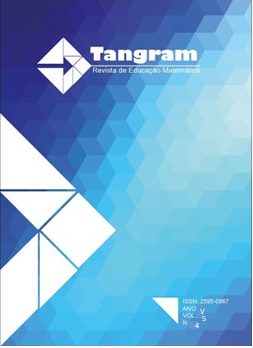Argumentação Matemática com Alunos Deficientes Visuais
DOI:
https://doi.org/10.30612/tangram.v5i4.13498Palavras-chave:
Educação MatemáticaResumo
O presente trabalho é uma análise a posteriori de uma experiência em que os autores, uma professora em formação inicial e um professor formador se propuseram a desenvolver uma sequência didática com objetivo de construir um ambiente comunicativo, com dois alunos deficientes visuais do primeiro ano do Ensino Médio, em uma sala de recursos multifuncionais. Os discentes foram incentivados a produzirem enunciados, construírem conjecturas e, a partir das atividades propostas, a questionar e comprovar, por meio da justificação suas conjecturas e desenvolver a argumentação matemática a respeito de funções quadráticas. Assim, este trabalho é um exemplo de como alunos deficientes visuais, quando tem acesso a atendimento educacional especializado de forma complementar e articulada às atividades e demandas da sala de aula comum, podem ampliar significativamente as condições de desenvolvimento de suas habilidades e competências matemáticas.
Downloads
Referências
ALMEIDA, W. N. C. & MALHEIRO, J. M. S. (2020). Operações epistemológicas apresentadas na argumentação desenvolvida por estudantes durante uma atividade experimental investigativa de matemática. Revista de Ensino de Ciências e Matemática, 11 (3), 264-285.
AMARAL, R. B. (2011, jan./jun). Argumentação matemática colaborativa em um ambiente online. Acta Scientiae, 13 (1), 55-70.
DANTE, L. R. (2016) Matemática: contexto & aplicações, ensino médio (3ª ed). São Paulo: Ática, 2016.
GARNICA, A. V. M. (1995) Fascínio da técnica, declínio da crítica: um estudo sobre a prova rigorosa na formação do professor de Matemática. Tese de Doutorado. Universidade Estadual Paulista, Rio Claro, SP, Brasil.
Lin, Pi-Jen. (2018, jul/set). O Desenvolvimento da Argumentação Matemática por Estudantes de uma Turma do Ensino Fundamental. Educação & Realidade, 43 (3), p. 1171-1192.
LINS, R.C. (1999). Por que discutir teoria do conhecimento é relevante para a Educação Matemática in Pesquisa em Educação Matemática: concepções e perspectivas Org. M.A.V. Bicudo. São Paulo: Unesp. 75-94.
LINS, R. C. (2012) Modelo dos Campos Semânticos: Estabelecimentos e notas de teorizações. In: Modelo dos Campos Semânticos e Educação matemática: 20 anos de história. Org. Angelo, C. L., BARBOSA, E. P., SANTOS, J. R. V., DANTAS, S. C. e OLIVEIRA, V. C. A. São Paulo: Midiograf. 11-30.
MAHER C. A e. MARTINO, A. M. (1996, marc). The Development of the Idea of Mathematical Proof: A 5-Year Case Study. Journal for Research in Mathematics Education, 27 (2), 194-214.
BRASIL (2018). MINISTÉRIO DA EDUCAÇÃO. Base Nacional Comum Curricular. Educação é a Base.
Downloads
Publicado
Como Citar
Edição
Seção
Licença
Copyright (c) 2022 TANGRAM - Revista de Educação Matemática

Este trabalho é licenciado sob uma licença Creative Commons Attribution-NonCommercial-ShareAlike 3.0 Unported License.
Os autores devem aceitar as normas de publicação ao submeterem a revista, bem como, concordam com os seguintes termos:
(a) O Conselho Editorial se reserva ao direito de efetuar, nos originais, alterações da Língua portuguesa para se manter o padrão culto da língua, respeitando, porém, o estilo dos autores.
(b) Autores mantém os direitos autorais e concedem à revista o direito de primeira publicação, com o trabalho simultaneamente licenciado sob a Atribuição-NãoComercial-CompartilhaIgual 3.0 Brasil (CC BY-NC-SA 3.0 BR) que permite: Compartilhar — copiar e redistribuir o material em qualquer suporte ou formato e Adaptar — remixar, transformar, e criar a partir do material. A CC BY-NC-SA 3.0 BR considera os termos seguintes:
- Atribuição — Você deve dar o crédito apropriado, prover um link para a licença e indicar se mudanças foram feitas. Você deve fazê-lo em qualquer circunstância razoável, mas de nenhuma maneira que sugira que o licenciante apoia você ou o seu uso.
- NãoComercial — Você não pode usar o material para fins comerciais.
- CompartilhaIgual — Se você remixar, transformar, ou criar a partir do material, tem de distribuir as suas contribuições sob a mesma licença que o original.
- Sem restrições adicionais — Você não pode aplicar termos jurídicos ou medidas de caráter tecnológico que restrinjam legalmente outros de fazerem algo que a licença permita.






